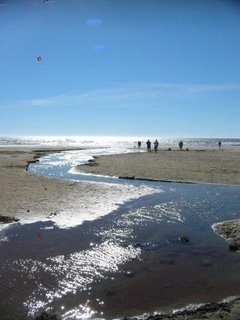 Excessive nutrients can have profound impacts to our coastal watersheds as well as the marine environment. Harmful algal blooms stemming from excessive nutrients can have major impacts on recreational use, drinking water, and shellfish harvest. When these algal blooms die-off it uses up the otherwise available dissolved oxygen that is required for survival by aquatic organisms, often leading to fish kills. Two years ago, Siuslaw Chapter Blue Water Task Force Coordinator Mark Chandler led the effort to pass a Phosphorus reduction ordinance (the first in the State!) in his community of Dunes City after seeing massive algal blooms in both Siltcoos and Woahink Lakes, now this issue has made it's way up the ladder to potentially be adopted as a statewide policy. Yesterday, a piece of legislation aimed at reducing the amount of Phosphorus contained in automatic dish soap was passed out of the House Environment and Water Committee by a unanimous vote, SB 631 now awaits a vote on the full House floor before it goes to the Governors Office for signature. Please take a moment and contact your State Representatives by clicking here and let them know that you support this common sense approach to reducing the amount of Phosphorus entering our lakes, rivers, and ocean. Once passed, this legislation will go in to effect at the same time as the State of Washington, as well as following the steps that 14 other states have already taken. To read more on this issue and how it fits into our overall efforts to improve water quality, click on the link below.
Excessive nutrients can have profound impacts to our coastal watersheds as well as the marine environment. Harmful algal blooms stemming from excessive nutrients can have major impacts on recreational use, drinking water, and shellfish harvest. When these algal blooms die-off it uses up the otherwise available dissolved oxygen that is required for survival by aquatic organisms, often leading to fish kills. Two years ago, Siuslaw Chapter Blue Water Task Force Coordinator Mark Chandler led the effort to pass a Phosphorus reduction ordinance (the first in the State!) in his community of Dunes City after seeing massive algal blooms in both Siltcoos and Woahink Lakes, now this issue has made it's way up the ladder to potentially be adopted as a statewide policy. Yesterday, a piece of legislation aimed at reducing the amount of Phosphorus contained in automatic dish soap was passed out of the House Environment and Water Committee by a unanimous vote, SB 631 now awaits a vote on the full House floor before it goes to the Governors Office for signature. Please take a moment and contact your State Representatives by clicking here and let them know that you support this common sense approach to reducing the amount of Phosphorus entering our lakes, rivers, and ocean. Once passed, this legislation will go in to effect at the same time as the State of Washington, as well as following the steps that 14 other states have already taken. To read more on this issue and how it fits into our overall efforts to improve water quality, click on the link below.
Oregon Nutrient Reduction_1pager.doc

